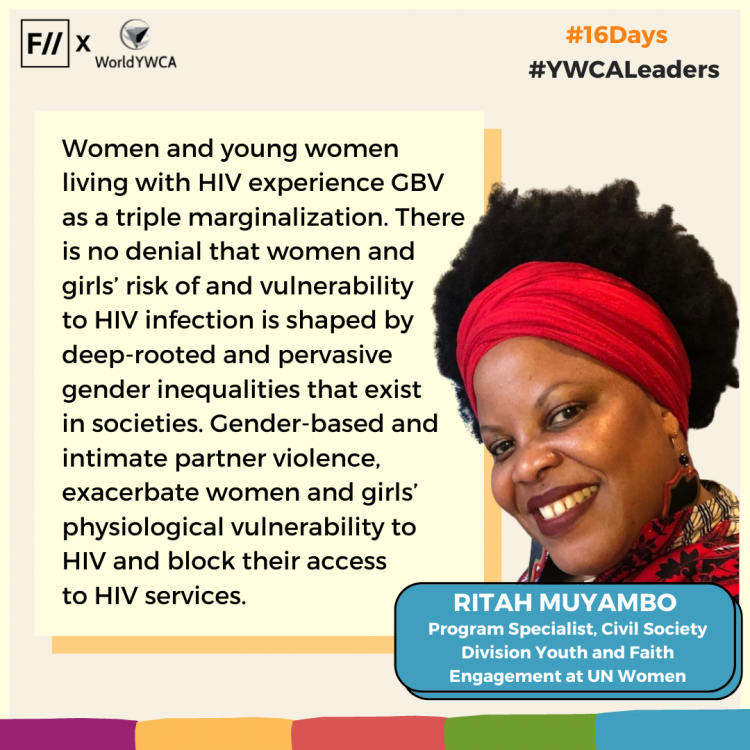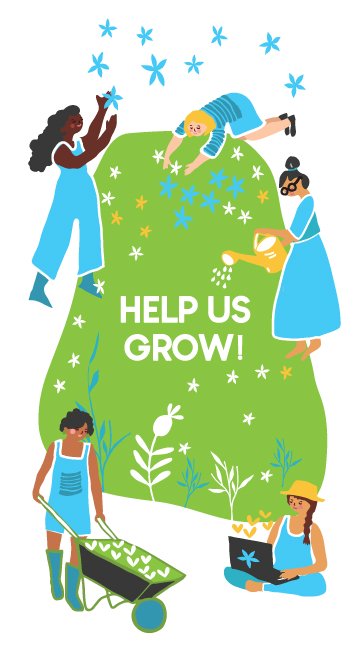The interview was part of the 16 Days of Activism series of World YWCA .
Ritah Muyambo, Program Specialist, Civil Society Division Youth and Faith Engagement at UN Women, who talks about how women and girls living with HIV/AIDS experience gender-based violence (GBV) as a double/triple marginalisation. She highlights how gender inequalities and GBV deprive women and girls of their fundamental human rights, including their right to education, health & economic opportunities. This, says Ritah, is coupled with the discrimination and stigma that women and girls living with HIV/AIDS continue to face in their daily lives.
Ritah joined World YWCA in 2014 as the Head of Programmes, which according to her was the “highlight of my career”. She advocated and fought for the rights of women and girls around the world, making an impact at the global scale on policies and programming within the largest and oldest women’s rights organization. She was responsible for ensuring the intergenerational engagement of YWCA member associations, consultations with strategic partners and donors and meangingful engagement of young women was critical to the strategic plan of 2015-2019. Working under the leadership of then Secretary General, Phumzile Mlabo-Ngcuka, she was part of the work that led up to the solidifying of Goal 2035.
Joining World YWCA in 2014 as Head of Programmes was a highlight of my career, advocating and fighting for the rights of women and girls around the world. I had an opportunity to work on a global scale and influence policies and programming within the largest and oldest women’s rights organization. I joined at a time when the organization was developing its quadrennial strategic plan 2015 – 2019. I jumped onto this wagon of excitement within the movement as we embarked on the journey to develop the 2035 goal.
“Working for World YWCA, the largest Women’s Rights Organization showed me the passion and power of women. It taught me to always look at issues using an intersectional lens ensuring that every process is rights based. I developed long lasting relationships with all the young women I collaborated with during that period. It also fore grounded the work that I am doing at UN Women as a focal point for all UN Women’s Youth and Faith engagement. It may sound cliché’ but once a YWCA, always a YWCA.”
People Living with HIV’s experience with GBV as a double/triple marginalisation
According to UNAIDS, today, half, or more of the 40 million people infected with HIV in the world are women. Millions of those infected with HIV are young people aged 15-24 years who now account for half of all new infections.[1]
Women and young women living with HIV experience GBV as a triple marginalization. There is no denial that women and girls’ risk of and vulnerability to HIV infection is shaped by deep-rooted and pervasive gender inequalities that exist in societies. Gender-based and intimate partner violence, exacerbate women and girls’ physiological vulnerability to HIV and block their access to HIV services.[2] Gender inequalities and gender-based violence rob women and girls of their fundamental human rights, including the right to education, health, and economic opportunities. This is all coupled by the different forms of stigma and discrimination that women and girls living with HIV/AIDS continue to face in their daily lives.
And in the last 2 years, people living with HIV face an increased jeopardy, HIV and COVID-19. UNAIDs reported that people living with HIV are at a higher risk of severe COVID-19 illness and death, yet the vast majority are denied access to COVID-19 vaccines. The State imposed lockdowns in most countries led to an increase in gender-based violence. A WHO 2013 study had already shown the health burden associated with violence against women, that women who had been physically or sexually abused were 1.5 times more likely to have a sexually transmitted infection. HIV is not only driven by gender inequality, but it also entrenches gender inequality, leaving women more vulnerable to its impact.[3]
The power imbalance between genders also means that many young women are not able to make decisions about their own lives. These inequalities are more severe for marginalized women, including female sex workers, transgender women, women who inject drugs, migrant women, and women with disabilities who are also at a heightened risk of discrimination and violence.[4]
How can we support survivors of GBV who are living with HIV/AIDS?
We need to take an intersectional approach to supporting survivors of GBV who are living with HIV/AIDs. The issues are complex and a need for a whole of society approach.
- Public Awareness is critical: We should not wait for the 16 days of activism or the World Aids Day to raise awareness. Everyday . Therefore, clear messages on the multifaceted, complex intersection of GBV and HIV is important. It’s also critical to believe survivors and ensure that services are readily available.
- Information: Globally, only 3 in every 10 adolescent girls and young women aged 15-24 years have comprehensive and accurate knowledge about HIV. The lack of information on HIV prevention and the power to use this information in sexual relationships, including in the context of marriage, undermines women’s ability to negotiate condom use and engage in safer sex practices. Therefore, we need to continue ensuring accurate information is shared at every point.
- Health services in addressing violence against women: Access to holistic health services, including psychosocial support and SRH services provide an important entry point. There is a need to continue pushing for global coverage of antiretroviral therapy to all those living with HIV. Proper care should be provided to those who are living with AIDs. Health services should develop context-specific responses to violence against women based on existing resources, level of staff training, referral options, and availability of other services.
- Training of service providers including the police: Capacities of first responders to GBV survivors especially the police and need to the strengthened. Proper and working referral systems are important. A need to focus on survivor centric methodologies that provide a safe environment is crucial.
- Community responses are critical to the HIV and GBV responses: In this instance we need to continue putting a spotlight on the role of traditional and religious leaders in combatting the stigma and discrimination that is associated with GBV and HIV. Women and girls and members of key populations should be supported to protect their own health, collectivize, and mobilize around their rights as part of the HIV and GBV responses. They should be part of decision-making processes related to national strategy development, program and policy design, and implementation, and human rights reporting processes related to combatting GBV and HIV. Evidence clears shows that service delivery, where facility-based services are complimented by community-led services are most effective.
- Economic empowerment of women: Women’s access to property and inheritance rights can be critical in preventing HIV. A baseline study conducted in nine countries (Cameroon, Ghana, Kenya, Malawi, Nigeria, Rwanda, United Republic of Tanzania, Uganda, and Zimbabwe) found that stigma associated with HIV-positive status was a significant deterrent to reporting or pursuing property and inheritance rights violations.
- Strengthening laws and policies: Policies on domestic violence and related gender issues at the level of international treaties, national laws and legislations, and institutions play an important role in addressing violence against women and reducing women’s vulnerability to HIV/AIDS. Legal norms directly affect women’s risk of acquiring HIV. In many countries where women are most at risk, laws to protect them are weak. A lack of legal rights reinforces the subordinate status of women, especially in relation to women’s rights to divorce, to own and inherit property, to enter contracts, to sue and testify in court, to consent to medical treatment and to open a bank account.
What is UN Women doing to combat GBV for people living with AIDS?
UN Women’s work to achieve gender equality and women’s empowerment takes the premise that progress in one area of equality leverages achievements in another. Conversely, attempts to roll back or deny such rights constitute an attack on women’s rights more broadly. Universal access to women’s and girls’ sexual and reproductive health and reproductive rights is therefore integral to the achievement of the goals of the 2030 Agenda for Sustainable Development, and especially Goal 5 on gender equality and women’s empowerment. The human rights of women include their right to have control over and decide freely and responsibly on matters related to their sexuality and individual agency, including sexual and reproductive health, free of coercion, discrimination, and violence.
The interconnectedness of UN Women’s work with partners within the United Nations System and with a wide range of stakeholders mean that partnerships are essential. These include efforts multiple efforts to repeal discriminatory legislation and norms that impede women’s access to sexual and reproductive health services; to prevent and mitigate the impact of HIV on women and girls within our co-sponsorship of the Joint UN Programme on HIV/AIDS and co-leadership of the Global Partnership for Action on HIV-related Stigma and Discrimination; with the Global Action Plan for Healthy Lives and Wellbeing for All; and our global work that addresses barriers that prevent women, children and adolescents from demanding and realizing their rights to health services. It is critical that together we ensure that rights-based normative frameworks and policies are established, civil registration of women and children’s identity, births, deaths, marriages are increased; transformation of discriminatory norms and gender stereotypes, attitudes and practices on women’s rights are promoted, and women, children and adolescents are empowered to exercise their rights and seek services.
We continue to push for the implementation of internationally agreed norms and standards relate to women and HIV and AIDS. Among the most prominent being The Beijing Declaration and Platform for Action as it calls for the involvement of women in HIV/AIDS policies and programmes; the review and amendment of laws that contribute to women’s vulnerability to HIV and AIDS and implementation of legislation, policies, and practices to protect women and girls from HIV/AIDS-related discrimination; and the strengthening of national capacity to create and improve gender-sensitive policies and programmes on HIV/AIDS. The Convention on the Elimination of All Forms of Discrimination against Women (CEDAW) and its General Recommendations contain important substantive provisions for advancing gender equality as they equip states parties with tools to promote the full realization of women’s human rights, including in developing gender-sensitive national responses to HIV/AIDS.
We continue to raise awareness through our different campaigns that include Orange the world during the 16 days of Activism.
“At UN Women, World YWCA is one of our strongest partners both as a faith partner and on intergenerational leadership, advocating for young women’s leadership.”
To know more about YWCA leaders like Ritah, follow our hashtag #YWCALeaders on social media and visit our “Our Leadership” section on the website.
[1] UNAIDS. 2004 Report on the global AIDS Epidemic: 4th global report. June 2004. Geneva, Switzerland: UNAIDS.
[2] UNAIDS (2016) ‘Prevention Gap Report’[pdf]
[3] WHO (2017) ‘Consolidated guideline on sexual and reproductive health and rights of women living with HIV’[pdf]
[4] Economic and Social Council (ECOSOC) (2015) ‘Review and appraisal of the implementation and the outcomes of the twenty-third special session of the General Assembly Report of the Secretary-General’ United Nations






